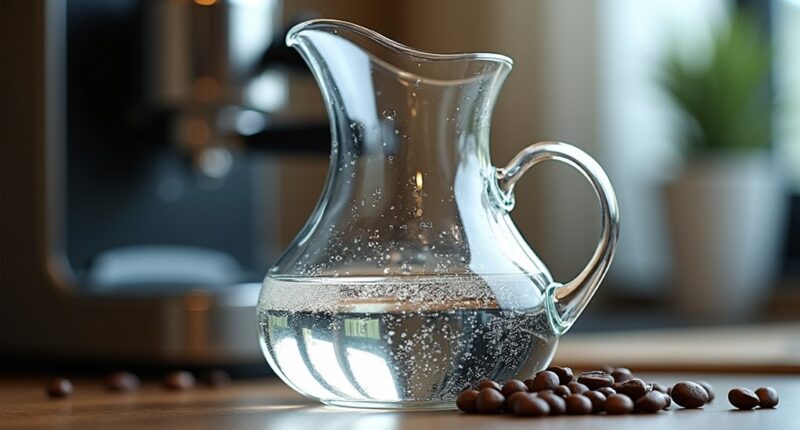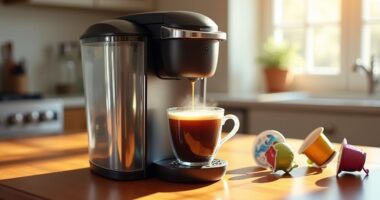When it comes to making the best espresso, choosing the right water is key! Aim for water with a good balance of minerals. Ideally, you want calcium around 30 to 70 ppm and alkalinity between 40 and 70 ppm. Tap water can work after some tweaks—just filter it to ditch unwanted stuff! And remember, too pure distilled water could ruin your drink’s vibe. Stick around, and you’ll discover more about crafting that perfect cup!
At a Glance
- Use water with calcium levels between 30 to 70 ppm for optimal flavor extraction in espresso.
- Maintain alkalinity levels between 40 and 70 ppm to enhance the overall taste profile of espresso.
- Distilled water can prevent scale buildup but may lead to flavor loss; a balanced mineral content is preferred.
- Filter tap water to remove chlorine and unwanted minerals, ensuring a better brewing experience.
- Invest in a quality filtration system to protect your espresso machine and improve water quality for brewing.
Importance of Water Composition in Espresso
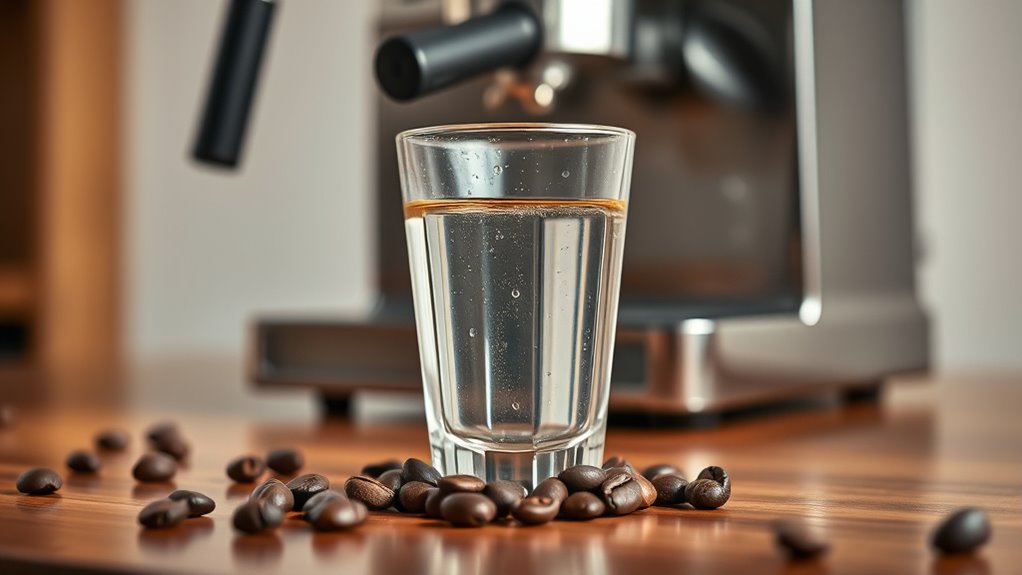
When you think about making a killer espresso, you might picture the perfect beans or that shiny machine, but let’s not forget the real MVP here: water!
It’s over 98% of your cup, and trust me, not all water is created equal. You’ll want to pay attention to those water profiles and find that sweet mineral balance.
Calcium and magnesium? They’re your friends for flavor extraction! Too much or too little, and you could end up with a cup that’s just, well, sad. The mineral balance of the water not only affects taste but also impacts the longevity of your espresso machine.
Understanding Distilled and Reverse Osmosis Water
So, you might be wondering why distilled and reverse osmosis (RO) water gets talked about so much when it comes to espresso, right?
Well, distilled water’s benefits include being free from minerals, which means no scale buildup in your machine—great news!
But here’s the catch: RO limitations can lead to a taste that’s a bit too acidic. Without those minerals, your espresso mightn’t shine like it should.
It’s like trying to bake a cake without sugar; you need a little sweetness! Additionally, using water with rich flavors can enhance the overall espresso experience, bringing out the complexity of its taste.
Ideal Mineral Content for Espresso Water
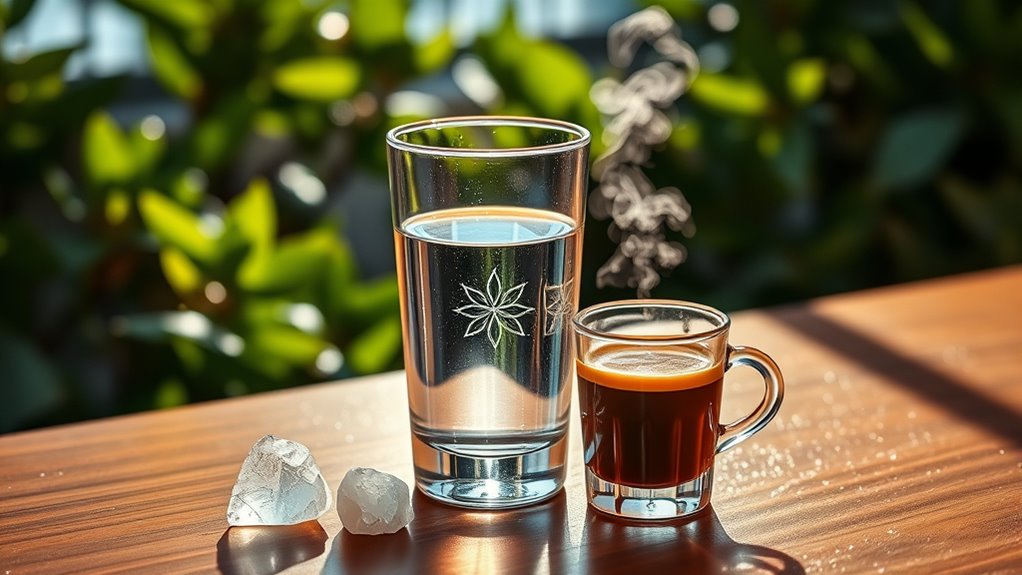
If you’re aiming for the perfect espresso, you’ve got to pay attention to the mineral content in your water—trust me, it makes a world of difference!
You want that ideal mineral balance, with calcium around 30 to 70 ppm and alkalinity between 40 and 70 ppm. This combo helps create a delicious flavor profile without risking scale buildup.
Think of it like adding just the right amount of seasoning to your favorite dish—too much or too little, and it’s a no-go! Additionally, using the best non-dairy creamers can enhance your coffee experience even further.
Tap Water Use and Treatment Options
Using tap water for your espresso might sound like an easy option, but it can be a bit of a double-edged sword.
You never know what’s lurking in that tap! It might’ve chlorine or minerals that throw off the flavor. So, think about water filtration to kick those nasty tastes to the curb.
If your tap water’s too soft or hard, mineral blending can help achieve that sweet spot. A little extra care goes a long way!
Test your water, filter it, and don’t be afraid to mix in some minerals. Your espresso deserves it, and you’ll taste the difference! Additionally, adjustable grind settings on your coffee grinder can enhance the extraction process, ensuring a more flavorful shot.
Temperature and Ph Considerations
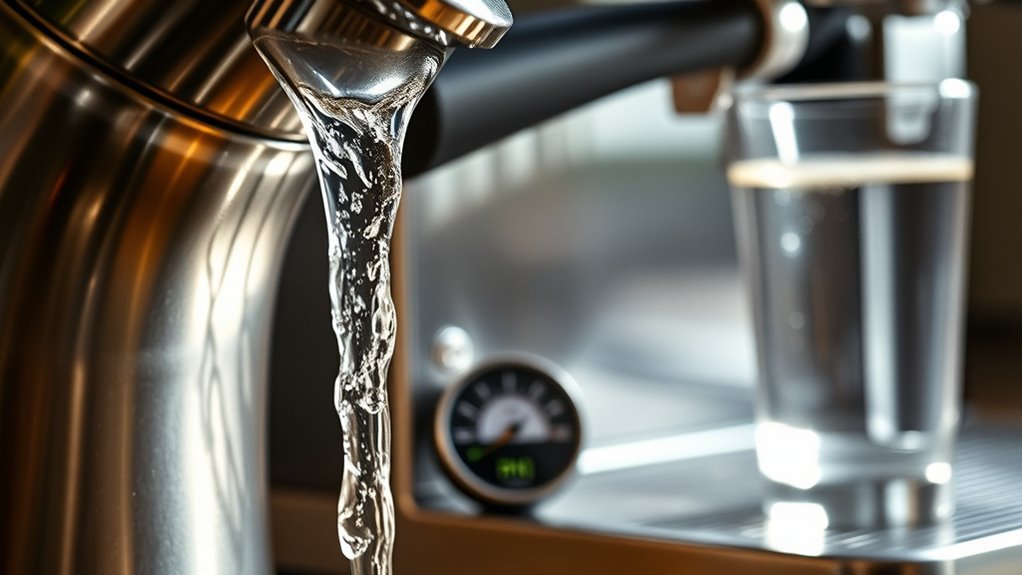
When it comes to brewing that perfect shot of espresso, you might not think about water temperature and pH right away, but trust me, they’re essential! The right temperature impacts extraction, while pH stability keeps flavors balanced. Aim for a water temperature between 90°C and 96°C (195°F to 205°F) and a pH of 6.5 to 7.5. This combo will give you that rich, delicious espresso you crave! Additionally, using water with the right mineral content can further enhance the quality of your espresso.
| Temperature Range (°C) | pH Range | Flavor Impact |
|---|---|---|
| 90 – 92 | 6.5 – 7.0 | Bright and fruity |
| 93 – 95 | 7.0 – 7.5 | Balanced and smooth |
| 96 | Above 7.5 | Over-extracted, bitter |
Maintenance and Machine Health Related to Water
Keeping your espresso machine in tip-top shape is essential, especially when it comes to the water you use.
Using water with the right mineral balance helps you avoid pesky scale buildup that can shorten your machine’s longevity. Trust me, nobody wants to deal with a clogged machine!
Distilled water might sound good, but it can actually cause corrosion over time. You want a happy medium—water that’s not too pure but still prevents scaling. Proper water selection contributes to a better brewing experience.
Investing in a good filtration system can save you time, money, and headaches, ensuring your espresso game stays strong and your machine runs like a dream!
Effects of Water Impurities on Espresso Flavor
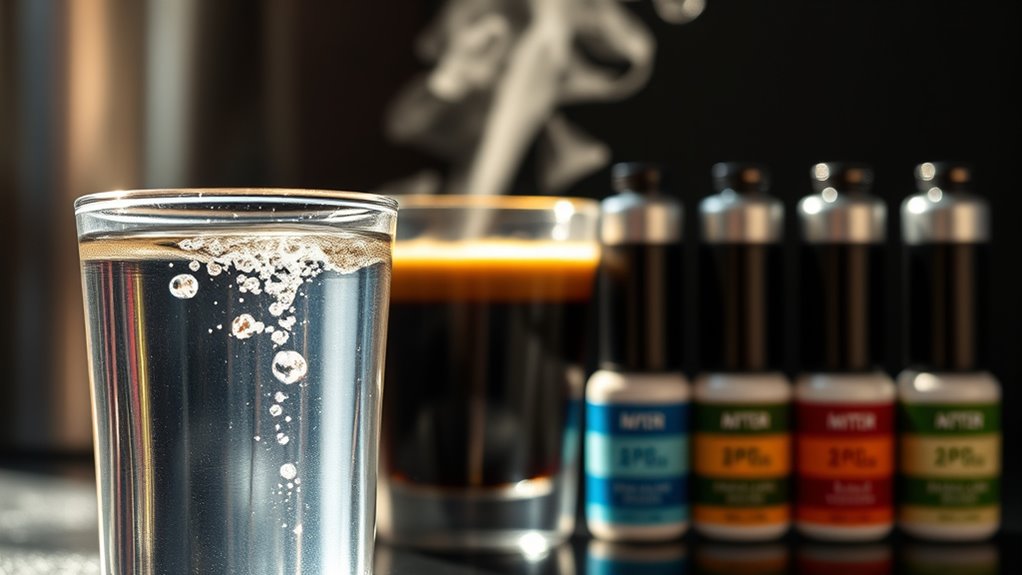
You mightn’t think about it, but the water you brew your espresso with can totally make or break your morning cup of joe. Impurities like chlorine can turn your rich espresso into a flavor disaster. You know, that weird aftertaste? Yeah, that’s water at work.
Investing in some good water filtration can be a game-changer for flavor enhancement. It’s like giving your brew a VIP pass to flavor town! Additionally, using high-quality materials in your brewing equipment can also help maintain the integrity of your espresso’s flavor profile.
Plus, nobody wants to deal with a machine that’s gunked up from hard water. So, keep it clean and enjoy the espresso experience you truly deserve. Cheers to great coffee!
Remineralization Techniques for Distilled Water
So, you’ve tackled the issue of water impurities and realized just how much they can mess with your espresso’s flavor.
Now, let’s get your distilled water back in shape with some fun remineralization methods! Here’s how to balance those minerals:
- Mineral Drops: Just add a few drops to your water for an instant boost.
- Mineralization Cartridges: These little guys can add minerals as water flows through.
- DIY Mix: Combine magnesium and calcium salts in the right ratios.
- Commercial Remineralizers: Grab a product designed for espresso to simplify the process.
Additionally, keeping your equipment clean can greatly enhance the quality of your espresso, especially when using vinegar cleaning tips. Let’s make that espresso shine!
Testing and Analyzing Your Water Quality
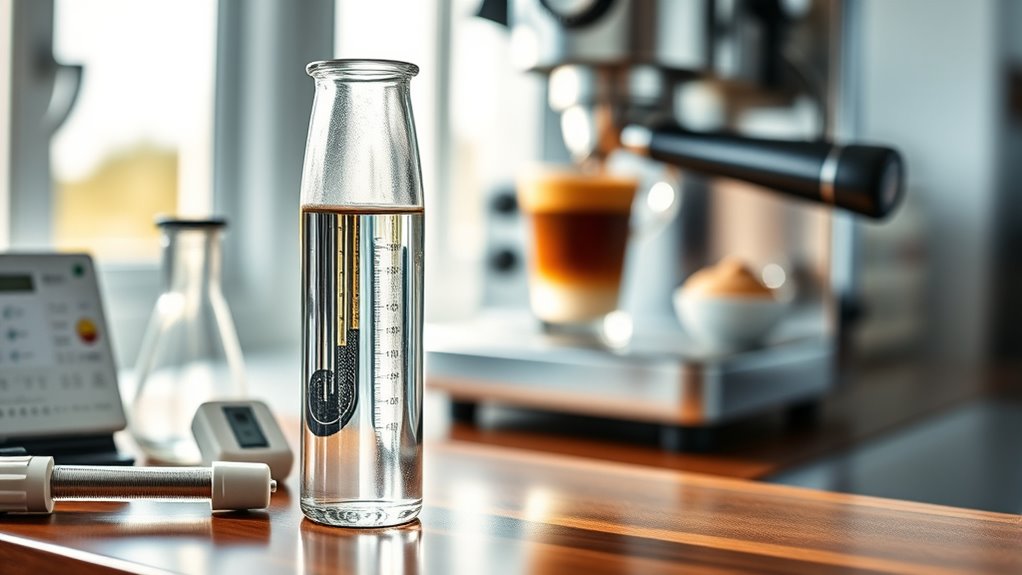
While you might think any old water will do for your espresso, testing and analyzing your water quality is like giving your brew a VIP treatment!
You wouldn’t serve your friends just any drink, right? Start with water testing kits—easy and fun! Check for minerals like calcium and magnesium; trust me, they’re your espresso’s best buddies. Additionally, the type of grinder you use can also influence how well your espresso extracts flavors from the water.
Quality analysis helps you understand if your tap water’s a superstar or a total flop. Remember, the right balance makes all the difference.
